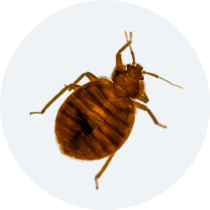Bedbugs
Bedbugs get their name because they like to live and feed in beds. Blood-feeding Bed Bugs probably evolved as cave – dwelling ectoparasites of mammals ( mainly bats ) and birds. When our ancestors moved into those same caves, one group of the bugs apparently switched hosts and developed a “preference” for humans’ blood. One species, the common Bed Bug (Cimex lectularius L.) , became the most directly associated with humans. As our civilizations developed, these bugs moved with us into tents, and then houses ; and they have remained a pest throughout recorded history.
In the past l0 years, bed bugs have been making a progressively more rapid expansion in the world. Several regional technical experts have been reporting them more and more often in homes, hotels, hostels, and long-term care facilities.

Bed bugs have been found naturally infected by > 20 human pathogens, but have never been proven to biologically transmit even one human pathogen. Although their bite is often nearly undetectable, their saliva contains several proteins which can cause a progressive sensitivity to repeated bites. Sometimes, humans who are frequently bitten by these bugs may develop a sensitivity ‘syndrome’ which can include nervousness, nearly constant agitation (“jumpiness”), and sleeplessness.


